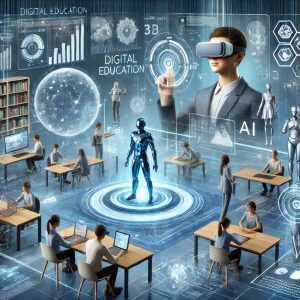In the rapidly evolving world of technology, one of the most frequently asked questions is whether artificial intelligence (AI) can replace business analysts. As we see AI becoming more integrated into businesses, automating processes, and performing data analysis with speed and precision, the question becomes not just theoretical but practical.
I’ll be diving deep into this topic to explore the potential of AI in business analysis, its limitations, and whether it can truly replace the role of business analysts in today’s businesses. By the end of this article, you will have a clear understanding of how AI is transforming the field of business analysis and where human expertise is still irreplaceable.
Introduction: The Role of Business Analysts in Today’s Businesses
Business analysts (BAs) are crucial players in the decision-making process of any organization. Their role revolves around gathering, analyzing, and interpreting data to identify business needs and solutions. They are responsible for bridging the gap between business problems and technological solutions, using data, analytics, and process modeling to guide organizations toward smarter decisions.
However, AI has gained substantial ground in recent years in areas that overlap with business analysis, including data gathering, process automation, predictive analytics, and decision-making. Given these advancements, the idea that AI could one day replace human business analysts is gaining traction.
But is this really feasible? Can AI handle the complexities of business analysis, or will it merely complement human expertise? In this article, I will break down the advantages and challenges, offer insights into AI’s capabilities, and help you understand the limitations that ensure human business analysts are still in high demand.
You also may like to read this: Can AI Be Part of Cross-Team Collaboration?
The Role of AI in Business Analysis: What Does AI Bring to the Table?
AI technology has already made waves in various sectors, and the field of business analysis is no different. Let’s look at some of the major areas where AI is currently reshaping the work of business analysts.
1. Data Collection and Analysis Automation
One of the key responsibilities of business analysts is to collect data from a variety of sources and analyze it to identify trends and insights. AI systems, especially those based on machine learning (ML), can handle vast quantities of data much faster and more accurately than any human. By automating data collection and analysis, AI tools like predictive analytics platforms and natural language processing (NLP) software can provide instant insights, reducing the need for manual data entry and preliminary analysis.
2. Predictive Analytics and Decision Making
AI can process historical data and generate predictive models to forecast future trends, helping businesses make data-driven decisions. Business analysts traditionally use statistical models to predict outcomes, but AI takes this a step further, using deep learning algorithms to identify complex patterns and make recommendations based on data analysis.
3. Automating Repetitive Tasks
Many tasks that business analysts perform, such as report generation, trend identification, and dashboard creation, are repetitive. AI can automate these tasks, saving time and allowing business analysts to focus on higher-level tasks that require human expertise, such as developing strategic recommendations or engaging with stakeholders.
4. AI-Assisted Reporting and Visualization
AI-powered tools like Tableau and Power BI, coupled with advanced algorithms, can help generate sophisticated visualizations based on large datasets, making it easier for business analysts to convey complex data to stakeholders. These platforms often incorporate automated insights, improving the speed and quality of reporting.
Can AI Fully Replace Business Analysts?
While AI can significantly enhance the work of business analysts, fully replacing them is not realistic in the near future. Business analysts do much more than just crunch numbers and generate reports. Let’s explore the reasons why human expertise is irreplaceable.
1. Strategic Decision Making and Context Understanding
AI may be great at analyzing data and identifying patterns, but it lacks the ability to understand the broader context of a business decision. For instance, a business analyst might identify a data anomaly, but interpreting its relevance and understanding its impact on the company’s strategy requires human insight, business acumen, and domain expertise. AI simply doesn’t have the capacity for high-level strategic thinking and contextual understanding that BAs provide.
2. Communication and Stakeholder Engagement
Business analysts are known for their strong communication skills, which are crucial for collaborating with stakeholders, gathering requirements, and negotiating between different departments. AI may provide the data, but it cannot interact with stakeholders, understand their needs, and translate technical insights into actionable plans in a meaningful way that aligns with organizational goals.
3. Ethical Decision-Making and Human Touch
While AI can help businesses make objective, data-driven decisions, it lacks the human element needed for ethical considerations. Many business decisions are not just about what the data says but also about what’s best for employees, customers, or society. AI is still far from capable of weighing these ethical factors with the nuance that a human business analyst can.
4. Creativity and Problem-Solving
Business analysts often apply creative thinking when solving complex business challenges. AI is driven by patterns and algorithms, making it more of a tool than a creative force. Humans bring innovation and a deep understanding of business culture to the table, which AI currently cannot replicate.
5. Handling Ambiguity and Uncertainty
AI thrives in structured environments where the data is clear and the problem is well-defined. However, business analysts frequently face ambiguous or complex problems where not all data is available or easily interpretable. In such cases, BAs rely on critical thinking and intuition, which AI cannot replicate at this point.
The Pros and Cons of Using AI in Business Analysis
| Feature | AI in Business Analysis | Human Business Analyst |
| Data Processing Speed | AI can analyze vast datasets quickly. | Human analysts can handle smaller datasets manually but at a slower pace. |
| Accuracy | AI reduces human error in data analysis. | Humans bring a nuanced understanding, though errors can occur. |
| Cost Efficiency | AI reduces costs for repetitive tasks. | Human BAs are essential for complex decision-making. |
| Adaptability | AI excels in structured, predictable tasks. | Humans excel in unstructured and dynamic business environments. |
Pros:
- Speed and efficiency in data processing
- Accuracy in identifying trends and anomalies
- Ability to automate repetitive tasks
- Cost-saving over the long term
Cons:
- Lacks strategic thinking and business insight
- No ability to handle ethical dilemmas or high-level decisions
- Struggles with ambiguous or unstructured data
- Requires oversight and human intervention for interpretation
Recommendations for Businesses: Balancing AI and Human Expertise
It’s clear that AI can significantly enhance the capabilities of business analysts, but it’s unlikely to replace them entirely. Instead, businesses should focus on creating a hybrid approach that combines the power of AI with human expertise. AI can handle repetitive tasks, process vast amounts of data, and provide insights that can be used by business analysts to make informed decisions. Meanwhile, the business analyst should focus on strategic planning, stakeholder management, and ethical considerations.
In the long term, businesses that leverage both AI and human analysts will be in the best position to make smarter decisions, improve efficiency, and remain competitive.


















